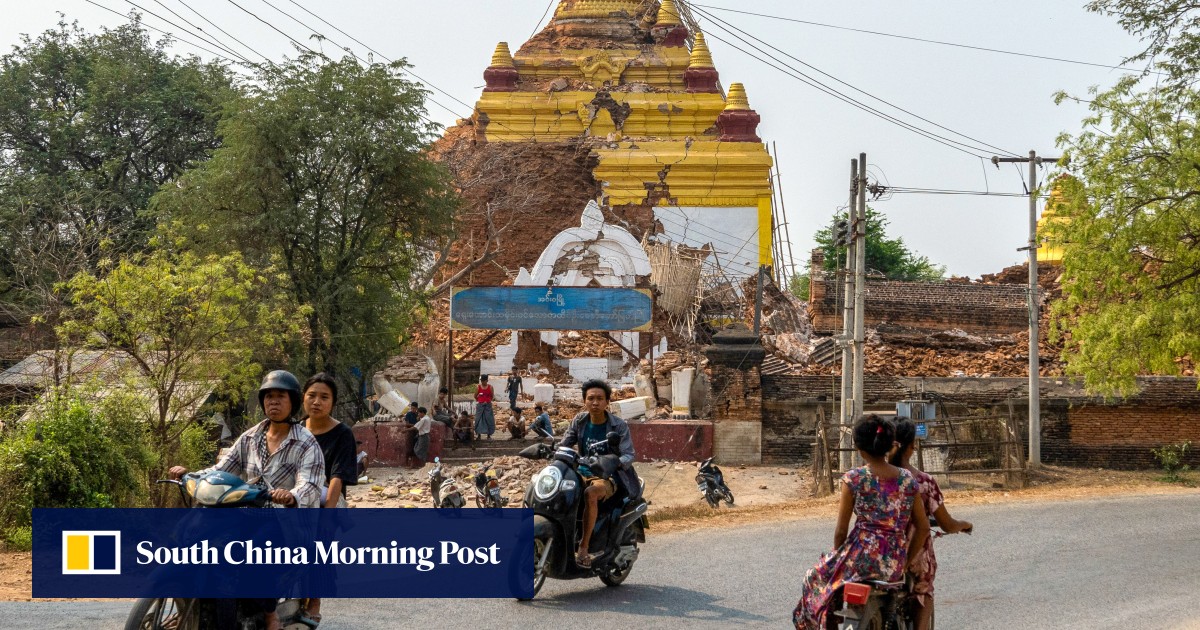BANGKOK – For years, Myanmar’s army chief, Senior General Min Aung Hlaing, has been treated like a pariah on the global stage.
Gen Min Aung Hlaing has made few overseas trips, other than to Russia and China, since he seized power in a coup in 2021.
Long the subject of Western sanctions, he has been barred from attending meetings of the Association of South-east Asian Nations, of which Myanmar is a member, because of his military’s failure to implement an agreed peace plan in the country’s civil war.
An arrest warrant by the International Criminal Court in November accusing him of crimes against humanity was supposed to isolate him further.
But on April 3, Gen Min Aung Hlaing arrived in Bangkok for a regional summit of a group of seven countries around the Bay of Bengal that also includes India and Thailand.
His visit comes less than a week after an earthquake in Myanmar on March 28 killed at least 3,085 people, and even as his military has come under fierce criticism for continuing airstrikes in the ongoing civil war, in the days after the disaster.
For the general, the visit – his first to a South-east Asian nation since April 2021 – will give his regime the international attention it has long desired. For the Thai government, which is already sheltering tens of thousands of refugees from Myanmar in camps along the border, stable relations with the military government could be aimed at trying to manage the flow of new arrivals.
But critics say the visit is the latest indication that Bangkok views human rights as irrelevant in foreign policy.
“They don’t care,” said Mr Kasit Piromya, a former Thai foreign minister.
“It’s an insult to Asean – that’s what it is all about,” he said, referring to the 10-member Southeast Asian regional grouping by its acronym. “It’s the fear of the Burmese army, the greed, and because all of them are not democratic.”
Thailand has said little about Gen Min Aung Hlaing’s visit beyond confirming it was taking place.
Justice for Myanmar, a watchdog, and 318 other organisations called on Thailand to disinvite the general, saying he had no legitimacy to represent the people of Myanmar.
When foreign governments and international organisations engage with the military junta, the organisations said in a statement, it “causes significant harm for the people of Myanmar” by legitimising the junta and assisting it in its war against its people.
“Senior General Min Aung Hlaing is grandstanding with Asian leaders in Bangkok following a devastating earthquake because he doesn’t care about Myanmar’s people,” Ms Elaine Pearson, Asia director for Human Rights Watch, said in a statement.
“What he cares about is garnering some legitimacy through high-level visits because ever since the February 2021 coup, he has been rightly ostracised by most of the international community.”
Gen Min Aung Hlaing, a deeply unpopular leader, became even more disliked after he overthrew a democratically elected government, led by Aung San Suu Kyi, the Nobel Peace Prize laureate, in the coup.
Since then, the country has been at war, with groups of armed protesters and powerful ethnic armies fighting the junta. In response, the military launched a scorched-earth campaign against its own citizens with multiple airstrikes, killing thousands of people.
At least 3 million are displaced. Myanmar’s economy has been wrecked following the coup, with millions of people thrown into extreme poverty, and criminality, such as the online scam centers that are flourishing in the country, has been exacerbated.
Myanmar’s military said Gen Min Aung Hlaing, who will start his meetings on April 4, is set to hold talks with various heads of government about the earthquake and discuss ways that other countries can help out in relief efforts. Besides Thailand and Myanmar, India, Sri Lanka, Bangladesh, Bhutan and Nepal will attend the summit.
On April 2, the Myanmar military called for a 21-day ceasefire to support relief and reconstruction efforts, a day after it fired on a Chinese Red Cross convoy trying to deliver food and medicine to desperate survivors.
It remains unclear whether the ceasefire would be honoured – armed rebel groups said that the military had launched scores of airstrikes since March 28’s 7.7-magnitude earthquake. NYTIMES
Join ST's Telegram channel and get the latest breaking news delivered to you.

 By The Straits Times | Created at 2025-04-04 03:04:29 | Updated at 2025-04-05 01:10:29
1 day ago
By The Straits Times | Created at 2025-04-04 03:04:29 | Updated at 2025-04-05 01:10:29
1 day ago








